- Application deadline: January 16, 2026 at 16:00;
- Invitations to interviews: by January 20, 2026;
- Interviews: January 26, 2026;
- Competition results: January 28, 2026;
- Start of collaboration: February 1, 2026.
Details: Job offers
Details: Job offers
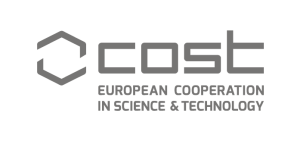
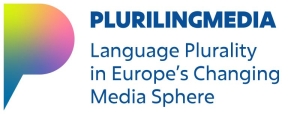
![]()
On 3–5 December 2025, COST Action CA23105 PLURILINGMEDIA was hosted at the Institute of Slavic Studies of the Polish Academy of Sciences.
On 3 December, the COST Action Management Committee meeting took place at the Staszic Palace. Around 40 people representing all European countries and many associated countries came to Warsaw for the annual meeting of the PLURILINGMEDIA network’s Management Committee. Other participants joined the meeting online.
The meeting was opened by Prof. Nicole Dołowy, leader of Working Group 3 Language Vitality and a member of the network’s Core Group, and Dr Craig Willis, Chair of COST Action PLURILINGMEDIA. The meeting focused on the actions undertaken within the network so far, plans for the upcoming year, and the longer-term outlook.
On 4–5 December, the 1st PLURILINGMEDIA General Conference: Media and Language Vitality, organised by the Institute of Slavic Studies PAS, was held. This two-day gathering of researchers and media practitioners working with minority languages was dedicated to the role of media in preserving and promoting these languages. More than 80 participants from Europe and associated countries took part.
Nine thematic sessions were organised on topics such as: translation and accessibility; reception and minority-language media; AI, accessibility and the digital divide; language vitality and print media; media and the preservation of identity and languages; language ideologies, stigmatization and media discourse; digital spaces and online language use; the role of journalists; social media and languages; and language learning and media. In addition to paper sessions, three panels were held on: multilingual families and media; virtual spaces; and new media in the context of the European Charter for Regional or Minority Languages.
The conference was opened by Prof. Elin Haf Gruffydd Jones, President of the European Language Equality Network (ELEN) from the University of Wales Trinity Saint David. Her lecture, “Resilience and Rights, Revitalisation and Reach: What Media Tells Us about the Future of Linguistic Diversity”, provided an overview of existing research on minority-language media and pointed to possible future research directions.
A plenary discussion featuring minority-language media practitioners also took place. The following speakers presented their work, its reception, and its possible impact on audiences:
– Anna Nikitiuk, who discussed her blog “Anna Nikitiuk – po swojomu” and the role of social media in preserving the local speech of Podlasie;
– Dr Piotr Szatkowski, who spoke about the presence of Kashubian on social media and his experience creating media content in the Mazurian language;
– Paola Valenta from the Associazione dei Giovani CNI – the association of young people belonging to the Italian minority in Slovenia.
Three representatives of the Institute of Slavic Studies PAS took part in the conference.
Prof. Nicole Dołowy, the main organiser of the conference, together with Prof. Sanita Martena from RTU Rēzekne Academy, delivered a paper titled “Digital Media and Their Role in Strengthening Literacy in Collateral Languages: Case Studies of Latgalian, Kashubian and Podlachian”, devoted to grassroots literacy practices in three collateral languages. Dr Piotr Szatkowski, a member of the COST Action PLURILINGMEDIA network and of the organising committee, presented the paper “AI-Generated Kashubian Voices: Community Perspectives on Concept and Implementation”, discussing the results of his survey on language attitudes and ideologies regarding the role of AI in producing content in both the dominant language (Polish) and the minority language (Kashubian). Dr Olha Tkachenko, in her paper “Dialects and Regional Languages on Ukrainian YouTube: Representation and Interaction” examined the ways regional languages are represented in Ukrainian social media.
The presentations and lectures were accompanied by lively discussions. The idea of COST Action is to foster networking among researchers as well as participants from outside the strictly academic sphere. The conference organised in Warsaw by the Institute of Slavic Studies PAS fulfilled this mission: it became a space for meetings, exchange of experiences, methods, and possible research applications.
More information about COST Action CA23105 PLURILINGMEDIA can be found at: https://plurilingmedia.eu/
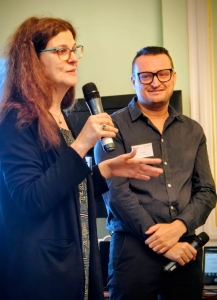
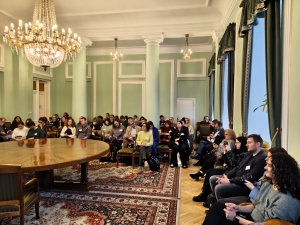
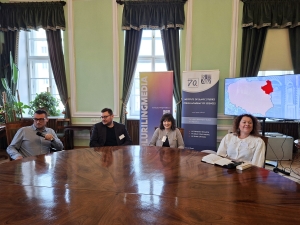
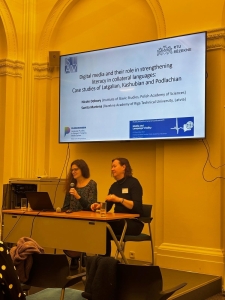
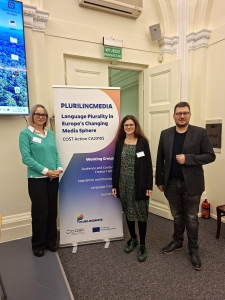
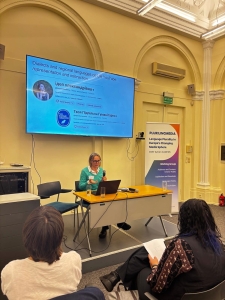
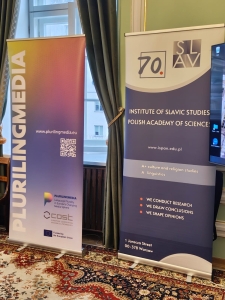
The official opening of the seminar “Contemporary Trends in Education: Ukrainian–Polish Experiences” took place on December 2, 2025. On behalf of the organizers: the Ministry of Education and Science of Ukraine, Donbas State Pedagogical University, the University of Szczecin, and the Ukrainian–Polish International Center for Education and Science, the guests, participants, and all those gathered were warmly welcomed by Dr. Habil. Roman Roszko, Prof. IS PAN.
In his welcoming address, Professor Roszko referenced the celebration of the fifth anniversary of the Ukrainian–Polish International Center for Education and Science at DSPU. He emphasized the extraordinary role of the Center in strengthening the Polish–Ukrainian partnership and its invaluable influence on the development of innovative education in Ukraine and Poland. He also announced that this year’s exceptional event would be the “Porta Vitae” Foundation Day, during which Polish Partners would share valuable, practical experience in working with children with special educational needs.
Prof. Roszko introduced the audience to the family of generative language models, PLLuM (Polish Large Language Model). He noted that they are the collaborative work of two consortia of Polish research institutions: PLLuM (in 2024) and HIVE AI (continuation of work in 2025), financed by the Ministry of Digital Affairs of the Republic of Poland. He paid particular attention to the role of the Institute of Slavic Studies of the Polish Academy of Sciences (IS PAN) in creating these models. He emphasized that the models were also trained on Ukrainian textual data and organic instructions, which significantly enhanced their capabilities in understanding the Ukrainian language and generating responses in that language.
Towards the end of his speech, Prof. Roman Roszko addressed the fundamental issue for humanities scholars: the ethical and effective use of artificial intelligence tools. The Professor acknowledged the unquestionable capabilities of generative language models and their potential for rapid data processing, but at the same time, he appealed for a critical approach.
Based on his own experiences, Prof. Roszko warned against the degeneration of cognitive competencies and the impoverishment of research methodology in the face of uncontrolled and excessive reliance on AI. He pointed out that the widespread use of these technologies can lead to the gradual loss of skills key to a humanities scholar, including deep analytical and synthesizing thought, the ability to extract data and evaluate source texts, argumentation, creating original associations, and drawing conclusions. Restricting the necessary intellectual effort of a researcher cannot be the source of true knowledge and creative work. Language models merely generate texts that look polished but are, in reality, nothing innovative—just the statistically most probable combination of tokens/words, which are derivatives of input data (textual, instructions, preferences).
Professor Roszko thus stressed the need to develop new standards for the work of a humanities scholar that reconcile the potential inherent in AI with the necessity of preserving fundamental human capacities.
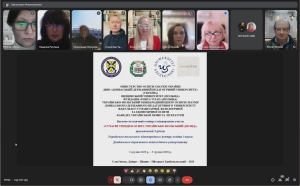
On November 27, 2025, the Donbas State Pedagogical University hosted a solemn ceremony to confer the prestigious title of Professor honoris causa on Dr. Pavlo Levchuk. This distinction was awarded in recognition of his outstanding contribution to the development of Ukrainian–Polish scientific cooperation, his efforts in promoting the Ukrainian language abroad, and his consistent support for the University’s academic community during the war and the relocation of the institution.
The meeting was led by Her Magnificence the Rector, Professor Svitlana Omelchenko.
Among the invited guests were:
The ceremony brought together representatives of the academic community, international partners, and students engaged in the development of linguistic and educational research.
During the ceremony, as a gesture of respect for the audience, Prof. Roman Roszko delivered his speech in Ukrainian, thanking the hosts for the invitation. Addressing the Madam Rector, the staff of the Donbas State Pedagogical University (DSPU), the Presidium, and the Members of the Scientific Council, he expressed deep appreciation for their perseverance and resilience in continuing their educational mission. He emphasized the exceptional importance of providing education during this extremely difficult time of war for Ukraine. He wished all those gathered good health, scientific achievements, and the quickest possible peace.
Subsequently, addressing all participants and the main honouree of the meeting – Dr. Pavlo Levchuk – Prof. Roszko expressed profound respect and appreciation for his outstanding scientific accomplishments. He presented the Laureate’s key research areas, after which he specifically emphasized that Dr. Levchuk is the architect of a unique bridge that effectively connects Poland and Ukraine. His work fosters deeper mutual understanding and the joint construction of a better future.
Congratulations!
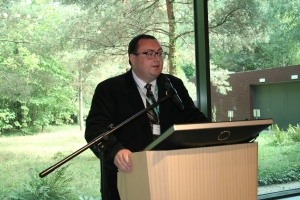
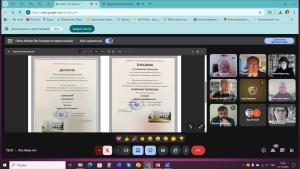
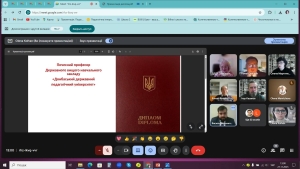
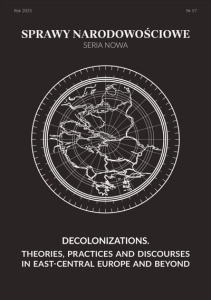 We are pleased to announce that the first four texts from issue no. 57 (2025) of the journal „Sprawy Narodowościowe. Seria Nowa” have been published. On the IS PAN journal platform, two articles are now available in open access:
We are pleased to announce that the first four texts from issue no. 57 (2025) of the journal „Sprawy Narodowościowe. Seria Nowa” have been published. On the IS PAN journal platform, two articles are now available in open access:
as well as two reviews:
The thematic focus of the issue is “Decolonizations: Theories, Practices, and Discourses in Central and Eastern Europe and Beyond”.
The editors of the issue are Dr. Ewa Wróblewska-Trochimiuk and Dr. Olha Tkachenko from the Institute of Slavic Studies, Polish Academy of Sciences, and Dr. Liudmyla Pidkuimukha from the National University of “Kyiv-Mohyla Academy.”
The texts are available here: https://journals.ispan.edu.pl/index.php/sn/pl/.
Further articles from issue 57 (2025) of „Sprawy Narodowościowe. Seria Nowa” will be published successively.
We invite you to read them!
We are pleased to announce that Dr. Katarzyna Taczyńska has received the prestigious Manya Friedman Memorial Fellowship for the implementation of her project “A Soldier and a Doll: The Holocaust in Post-Yugoslav Memory”.
As part of the fellowship, Dr. Taczyńska will conduct research at the Jack, Joseph and Morton Mandel Center for Advanced Holocaust Studies at the United States Holocaust Memorial Museum in Washington. The Mandel Center works to enhance the visibility, significance, and development of Holocaust studies in the United States and around the world, as well as to sustain and deepen the relevance of Holocaust memory.
Learn more about the project and its author here:
https://www.ushmm.org/research/about-the-mandel-center/all-fellows-and-scholars/dr-katarzyna-taczynska
Warm congratulations!


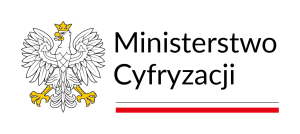
On October 21st, 2025, MS Valéry Trân Thiên of the Semantics and Computational Linguistics Team at ISS PAS represented the HIVE AI consortium at Masters and Robots Warsaw 2025. The event attracted experts, entrepreneurs, innovators, technologists, and leaders from renowned global academic institutions, associations, and technology blogs including Google, NYU Stern School of Business, Executive Coaching and Consulting Institute, Imperial Business School in London, Eindhoven AI Systems Institute, Copenhagen Business School, Queensland University of Technology, Human Future, and What’s Next? etc.
At the Ministry of Digital Affairs of Poland stand, Valéry Trân Thiên addressed visitor inquiries about the progress of artificial intelligence development within Poland. He discussed both commonalities and distinctions between prominent Polish generative models, Bielik and PLLuM. The majority of questions centered on the PLLuM model and its deployments in the municipal offices of Gdynia and Łódź.
Since 2024, the Semantics and Computational Linguistics Team of the Institute of Slavic Studies, PAS, has been actively involved in advancing artificial intelligence through participation in two major projects funded by the Ministry of Digital Affairs: PLLuM (“Responsible development of an open large language model PLLuM [Polish Large Language Universal Model] to support breakthrough technologies in the public and economic sectors, including an open-source Polish-language intelligent citizen assistant”) and HIVE AI (“HIVE AI: Development and pilot deployment of large language models in Polish public administration”). The team’s participation at prominent national and international events is a key component of wider efforts to promote the PLLuM family of Polish generative models.
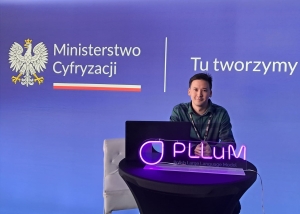


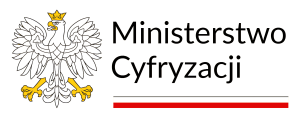
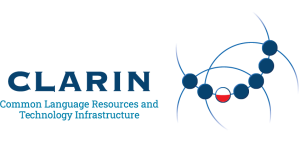

On October 6–7, 2025, at the International Congress Centre in Katowice, during the XXIII Local Government Capital and Finance Forum, Dr hab. Roman Roszko, prof. IS PAN, head of the Semantics and Computer Linguistics Team at ISS PAS, promoted effective ways to apply artificial intelligence in the daily work of local governments in Poland.
The Forum organizers invited Prof. R. Roszko as a speaker to participate in the debate: “Artificial Intelligence in Local Governments – Real Applications or Just a Trend?”. The debate was extended by a lunch break due to high interest. Local government officials were interested in specific application scenarios for generative models created within the HIVE AI project, as well as the tools and resources of CLARIN-PL-BIZ-Bis. Their primary concerns revolved around the security and quality of solutions utilizing artificial intelligence. The anxieties of local government representatives, who mostly associated artificial intelligence with readily available online chatbots, were alleviated during a presentation of RAG instances operating on PLLuM models. It should be noted that these types of solutions are currently being implemented by the HIVE AI consortium, among others, in the Gdynia City Hall.
Prof. Roman Roszko also spoke with representatives from companies involved in providing digital services to government offices at various administrative levels. A promising collaboration emerged between IS PAN and Warsaw-based company ABC PRO sp. z o.o. (https://abcpro.pl/) regarding legal electronic monitoring – solutions that the aforementioned company offers and plans to develop further with additional functionalities related to artificial intelligence.
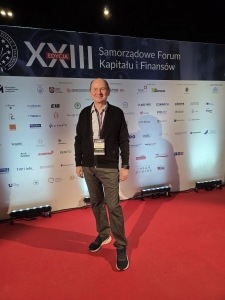
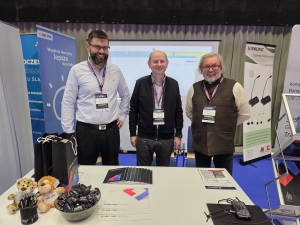



On September 30, 2025, Valéry Trân Thiên, MA, from the Semantics and Computational Linguistics Team at ISS PAS represented the HIVE AI consortium during the Synerise Cup 2025 – the jubilee national championships for schools and kindergartens in chess. At the Ministry of Digital Affairs of Poland booth, he answered visitors’ questions about artificial intelligence and Polish Large Language Models (PLLuM). Every visitor to the booth could converse with the PLLuM generative model. Testers evaluated the knowledge of the Polish generative model, including its understanding of chess.
In 2024, the Semantics and Computational Linguistics Team of the Institute of Slavic Studies, Polish Academy of Sciences, participated in the PLLuM project (“Responsible development of an open large language model PLLuM [Polish Large Language Universal Model] to support breakthrough technologies in the public and economic sectors, including an open, Polish-language intelligent citizen assistant”), funded by the Ministry of Digital Affairs of Poland. The result of this work is the PLLuM family of generative models in base, chat, instruct, and non-commerce versions.
In 2025, the developed PLLuM models are being further developed and implemented in mObywatel (the Polish digital ID app) and selected offices of state administration within a new project called HIVE AI (“HIVE AI: Development and pilot implementation of large language models in Polish public administration”), funded by the Ministry of Digital Affairs of Poland. Stands/kiosks operated by the Ministry of Digital Affairs at important national and international events are part of a larger promotion of the PLLuM family of Polish generative models.
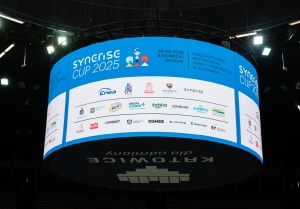
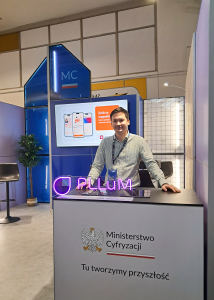



![]()
From September 25–27, 2025, the Semantics and Computational Linguistics Team (SILK Team) of the Institute of Slavic Studies, Polish Academy of Sciences participated in the 7th International Conference on Applied Linguistics “Languages and People” (LiTaKA) at Vilnius University.
Representing the SILK Team, Prof. Andrius Utka and Prof. Jurgita Vaičenonienė presented the team’s achievements in three projects carried out at the Institute of Slavic Studies, Polish Academy of Sciences, related to broadly defined digital humanities.
Authors of the presentation: Roman Roszko (Institute of Slavic Studies PAS), Tomasz Bernaś (Institute of Slavic Studies PAS), Danuta Roszko (University of Warsaw), Andrius Utka (Vytautas Magnus University), Jurgita Vaičenonienė (Vytautas Magnus University).
The title of the presentation: (en) Lithuanian Text Data and Organic Instruction Corpora in the DARIAH-HUB, HIVE AI, and PLLuM Projects; (lt) Lietuviškų tekstinių duomenų ir instrukcijų tekstynai DARIAH-HUB, HIVE AI ir PLLuM projektuose; (pl) Litewskojęzyczne korpusy danych tekstowych i instrukcji organicznych w projektach DARIAH-HUB, HIVE AI ir PLLuM.
Presentation languages: Lithuanian and English.
In 2024, Prof. Jurgita Vaičenonienė and Prof. Andrius Utka of VDU were members of the SILK Team within the PLLuM project (consortium leader: Wroclaw University of Science and Technology, members: Institute of Computer Science of the Polish Academy of Sciences, Institute of Slavic Studies of the Polish Academy of Sciences, National Information Processing Institute – OPI PIB, Research and Academic Computer Network – NASK PIB, University of Łódź) funded by the Ministry of Digital Affairs of Poland. Both were responsible for acquiring, describing with metadata, deduplicating and cleaning a portion of Baltic text data, as well as preparing organic instructions (localization, identity-based, single- and multi-turn generative, etc.) necessary during the pre- and post-training phases of the PLLuM model family. The presentation delivered to the audience sparked lively discussion about large language models and their applications. Attendees also expressed interest in the reasons why the SILK Team at ISS PAS conducts research extending far beyond the Polish language, particularly considering that such work requires not only specialized knowledge but primarily significant effort and substantial funding (energy costs).
The SILK team and CLARIN-PL have been closely collaborating with Lithuanian CLARIN-LT structures for ten years. Professor Jurgita Vaičenonienė from Vytautas Magnus University is the national coordinator of the CLARIN-LT infrastructure. Professor Sigita Rackevičienė, pictured in Figure 1, from Michael Römer University in Vilnius, is one of the partners of CLARIN-LT.
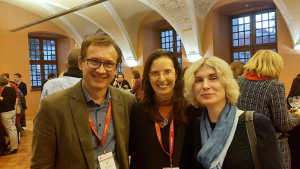
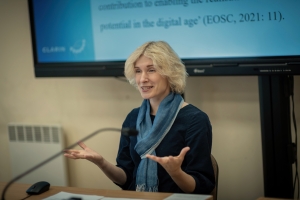
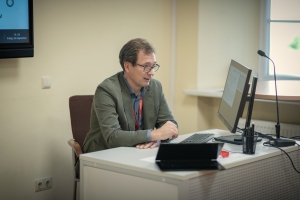
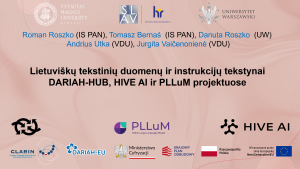
By continuing to use the site, you agree to the use of cookies, in accordance with the current browser settings. Privacy policy
The cookie settings on this website are set to "allow cookies" to give you the best browsing experience possible. If you continue to use this website without changing your cookie settings or you click "Accept" below then you are consenting to this.